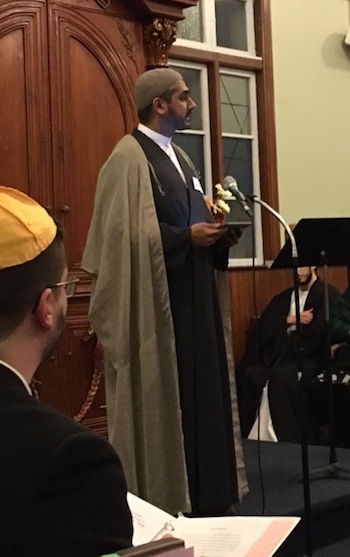David Coskun dances as Seemi Ghazi speaks. (photo by Matthew Gindin)
On March 9, Congregation Or Shalom, in collaboration with the Anglican Diocese of New Westminster, hosted United in Compassion, an interfaith solidarity event featuring 15 different religious leaders from diverse communities of faith.
The packed synagogue was addressed by faith leaders in clerical collars, kippot, dervish dress, imam robes and even a Zen rakusu (ceremonial garment worn around the neck). During the hour-long devotional service, each leader offered brief words and contemplations on interfaith harmony and peace.
“God created a universe filled with diversity. Every human is free to choose their own beliefs. There is no compulsion in religion,” said Imam Mohammad Shujaath Ali, a Sunni Muslim of Masjid-Ul Haqq mosque, quoting the Quran. “For society to flourish,” he said, “we need these three qualities: compassion for others, collaboration among all, and toleration of views we disagree with. All creatures are God’s family, and God loves those who treat his family well.”
The imam was followed by David Coskun and Seemi Ghazi of the Rifa’i Marufi Sufi order. Coskun, dressed in a long, white, flowing robe and tall hat, performed a hypnotizing, meditative dervish twirl, while Ghazi spoke. “The path of the Sufi, it is all about tawhid (unity),” she explained. “Because of knowing the oneness of all things, we are unafraid to turn in all directions.”

Ghazi sang a haunting rendition of the Sufi song “I Desire Nothing But You,” commenting, “This is a love song to my brothers and sisters here in this synagogue and down south, that you flourish and are safe and protected.”
Sheikh Murtaza Bachoo of the Shia Muslim Community of British Columbia spoke about ar-rahma, compassion in Arabic, echoing the word for compassion in Hebrew, rachamim. “Compassion,” he said, “is the attribute of God we need to manifest in these times of racism, antisemitism, Islamophobia and xenophobia. God’s compassion is boundless and overflowing, and knows no boundaries among creatures.”
Rabbi Laura Duhan Kaplan, former spiritual leader of Or Shalom and current director of Inter-Religious Studies at Vancouver School of Theology, chanted verses from Genesis describing the creation of human beings in the divine image. She cited a midrash explaining that, when God says “in our image,” it is a reference to all of the different creatures, all of whom are spiritually interconnected. God blessed us, saying, “May you become diverse, may you take good care of each other, and of all creation.”
Bishop Reverend Dr. Gregory Mohr of the B.C. Synod of the Evangelical Lutheran Church in Canada read some of the official pronouncements of his order on the subject of “welcoming the stranger,” stressing that “the stranger” refers not only to newcomers to Canada but to “people already here, people maybe right next door, who we have overlooked and do not know.”
Some of the presenters offered brief devotions or meditations. Eric Kristensen of the Religious Society of Friends (Quakers) invited audience members to consider some leading thoughts from Quakers of the past into silent questioning.
Linda Mackintosh of the Sathya Sai community offered some thoughts of her guru on world peace, and Sandra Leigh of Give Peace a Chant Kirtan shared the musical chanting of the ancient Gayatri Mantra. Parvin Manshadi of the local spiritual assembly of the Baha’is of Vancouver recited a prayer for peace written by Baha’ullah, and Firdosh Mehta of the Zoroastrian Society of British Columbia shared teachings of the Zoroastrian scriptures on universal ethical values and peace. Michael Newton of the Mountain Rain Zen Community led the congregation in meditation on loving-kindness for ourselves and one another.
Bishop Melissa Skelton of the Anglican Diocese of New Westminster read two poems by secular poets – Israeli Yehuda Amichai and Palestinian-American Naomi Shihab Nye – to express the need for Israelis and Palestinians to embrace one another.
“Then it is only kindness that makes sense anymore,” concluded the poem by Shihab Nye. “Only kindness that ties your shoes and sends you out into the day to gaze at bread / only kindness that raises its head / from the crowd of the world to say / It is I you have been looking for / and then goes with you / everywhere / like a shadow or a friend.”
“In the parashah for this week,” said Rabbi Adam Stein of Congregation Beth Israel, “it says, ‘Build Me a sanctuary, and I will dwell among them.’ It does not say God will dwell in the sanctuary, but rather ‘among them.’ Tonight, I feel we have made a sanctuary for God and brought out the godliness that dwells among us.”
Or Shalom’s Rabbi Hannah Dresner closed the evening, leading the audience in a niggun, a sacred, wordless melody. She chose the Rav’s Niggun, composed by Rabbi Schneur Zalman of Liadi, the first Lubavitcher Rebbe, symbolizing the soul’s ascent to God, which is commonly sung at Lubavitcher weddings. “The melody brings out the solemnity and the beauty of when souls come together to truly connect with each other,” said Dresner. “This is what I feel we have done tonight.”
After the service, people met downstairs for food and drinks, having conversations together facilitated by a set of posted questions at each table on hope, inter-communal tolerance and peace.
Matthew Gindin is a freelance journalist, writer and lecturer. He writes regularly for the Forward and All That Is Interesting, and has been published in Religion Dispatches, Situate Magazine, Tikkun and elsewhere. He can be found on Medium and Twitter.

